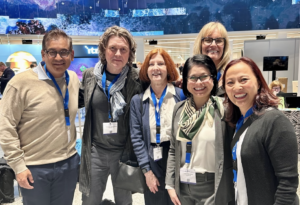NETRF’s impact on neuroendocrine cancer research was evident at the 20th Annual European Neuroendocrine Tumor Society (ENETS) Conference, held March 22-24 in Vienna. The ENETS Conference is a gathering of international NET clinicians and scientists who discuss cutting-edge NET science. About 1,100 researchers, clinicians, and patient advocates attended in person, and more than 300 attended virtually.
Basic and translational research had a higher profile this year. Chrissie Thirlwell, MD, Ph.D, co-chair of NETRF’s Board of Scientific Advisors, delivered a keynote talk with a look at ten years of NET basic research. “It is fantastic to see NETRF grantees more prominent at ENETS,” said Dr. Thirlwell. “The NET research community is collaborating and open to sharing new ideas.”

L-R: Dr. Simron Singh, Dr. Thor Halfdanarson, Elyse Gellerman, Dr. Jaydira Del Rivero, LACNETS’ Lisa Yen & PheoPara Alliance’s Stephanie Alband
Eight NETRF grantees were chosen to present their basic and translational work during the forum.
Jerome Cros: Temozolomide and NETs: Friends or Foes?
Talya Dayton: Druggable growth dependencies and tumor evolution analysis in patient-derived organoids of neuroendocrine cancer
Jules Dirks: Protein validation of multiomic classified pulmonary carcinoid: Identification of unique clinical subtypes and potential therapeutic vulnerability
Lynette Fernandez-Cuesta: Recent molecular classifications of lung NENs
Matthieu Foll: The lungNENomics project: A Comprehensive Multidisciplinary Characterization of pulmonary carcinoids
Harry Hodgetts: Mesenteric fibrosis in SI-NETs—steps towards understanding its pathogenesis
Netta Makinen: Transcriptomic analyses of multifocal ileal neuroendocrine tumors
Amit Tirosh: The effect of pseudohypoxia on the immune microenvironment of pancreatic NENs
NETRF sponsored ENETS’ prizes for the best oral presentations. Dr. Dirks was awarded the ENETS prize for best clinical science oral presentation, for his work on pulmonary NETs. The prize for best basic science oral presentation was awarded to Alberto Lens-Pardo for his work on predictive transcriptomic signatures of response to axitinib in patients with advanced NETs participating in the AXINET clinical trial.
